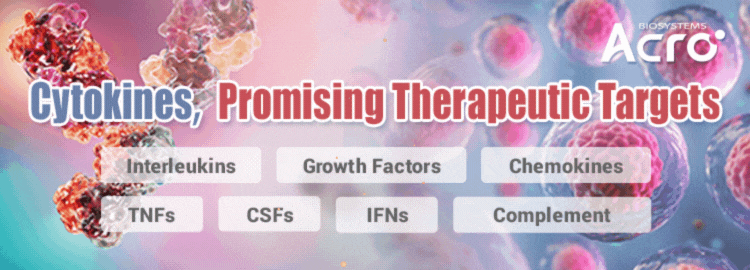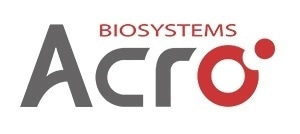Cytokines are important protein mediators of immunity, inflammation, and cell behavior. Given that these are the main biological processes involved in autoimmunity, there is evidence that cytokines play a crucial role in the pathogenesis of autoimmune diseases.
The role of cytokines in AS, PsA and SSc
The development of ankylosing spondylitis (AS) is closely linked to immune system dysfunction, involving the irregular release of inflammatory factors and an imbalance of immune cells, both of which play pivotal roles in the disease's progression.

Ankylosing Spondylitis. Image Credit: ACROBiosystems

Psoriatic arthritis. Image Credit: ACROBiosystems

Systemic Sclerosis. Image Credit: ACROBiosystems
High levels of cytokines such as TNF-α, IL-17, and IL-23 can trigger inflammatory responses and expedite joint damage.
Monoclonal antibody drugs like adalimumab, etanercept, secukinumab, and guselkumab, which target these critical cytokines, have become essential in the treatment of AS. Additionally, IL-6 inhibitors have shown promising clinical results in recent years, presenting the potential to significantly slow disease progression.
Therefore, precisely targeting key inflammatory factors may offer an effective strategy to control AS development and enhance patient outcomes.
Psoriatic arthritis (PsA) is a persistent inflammatory condition that can cause joint destruction and deformities, severely affecting patients' quality of life. Enhanced understanding of PsA's pathological mechanisms has led to the emergence of new treatment options, providing new directions for managing the disease.
TNF-α inhibitors
TNF-α is recognized as the most potent proinflammatory cytokine currently known and is crucial in the pathogenesis of PsA. TNF-α inhibitors have been shown to significantly relieve symptoms in patients. The FDA has approved five TNF-α inhibitors for the treatment of PsA: infliximab, etanercept, adalimumab, and golimumab.
These inhibitors have proven effective in controlling both the symptoms and progression of PsA.
IL-17 inhibitors
IL-17A is part of the IL-17 cytokine family and plays a key role in arthritis, skin lesions, and enthesitis, which are associated with PsA. Several IL-17 inhibitors are currently in development, two of which have been FDA approved for treating PsA. These are secukinumab and ixekizumab.
These IL-17 inhibitors have shown efficacy in managing a variety of manifestations of PsA by targeting this main inflammatory cytokine.
IL-12/IL-23 inhibitors
The IL-12/IL-23 axis plays a crucial role in the pathogenesis of psoriatic arthritis (PsA). Targeting the IL-23p19 subunit, the inhibitor tildrakizumab is currently undergoing phase III clinical trials. The FDA has approved several IL-12/IL-23 inhibitors for the treatment of PsA, including ustekinumab, guselkumab, and risankizumab.
These therapies that block IL-12/IL-23 signaling have demonstrated efficacy in the management of the many diverse manifestations of PsA through intervention in this key inflammatory pathway.
Systemic Sclerosis (SSc) is a rare systemic autoimmune disease typified by high levels of clinical heterogeneity. Immune cells release a range of cytokines and growth factors, which are believed to be critical in the inflammatory and fibrotic processes of SSc.
Cytokines such as IL-1, IL-4, IL-13, IL-17, IL-23, and IL-31 play a part in regulating the inflammatory, fibrotic, and vascular processes in SSc, which makes them potential targets for therapeutics. High IL-6 levels are in close association with a poor prognosis, which also makes it a potential target for SSc treatment.
Therapies that target the TGF-β pathway, like fresolimumab, have begun phase I clinical trials. Brodalumab, an IL-17 inhibitor capable of inducing vascular disease, inflammation, and fibrosis, has begun phase III clinical trials.
In addition, inhibiting IL-1, IL-31, and interferon signaling pathways has demonstrated promising prospects for treating SSc.
ACROBiosystems advances autoimmune disease treatment with novel therapeutic solutions
ACROBiosystems offers a series of recombinant cytokines and their receptors, including Interleukins, Chemokines, CSFs, IFNs, Growth Factors, TNFs, and Complement Components with high levels of purity, high bioactivity, and high batch-to-batch consistency to speed up autoimmune disease drug development programs.

Image Credit: ACROBiosystems
ClinMax™: Reliable ELISA kits for precise autoimmune analysis
ClinMax™ ready-to-use ELISA kits have been launched with stringent quality control measures to ensure precision, stability, and consistency in analysis results, effectively meeting your experimental needs.

Image Credit: ACROBiosystems
About ACROBiosystems
ACROBiosystems is a cornerstone enterprise of the pharmaceutical and biotechnology industries. Their mission is to help overcome challenges with innovative tools and solutions from discovery to the clinic. They supply life science tools designed to be used in discovery research and scalable to the clinical phase and beyond. By consistently adapting to new regulatory challenges and guidelines, ACROBiosystems delivers solutions, whether it comes through recombinant proteins, antibodies, assay kits, GMP-grade reagents, or custom services. ACROBiosystems empower scientists and engineers dedicated towards innovation to simplify and accelerate the development of new, better, and more affordable medicine.
Sponsored Content Policy: News-Medical.net publishes articles and related content that may be derived from sources where we have existing commercial relationships, provided such content adds value to the core editorial ethos of News-Medical.Net which is to educate and inform site visitors interested in medical research, science, medical devices and treatments.